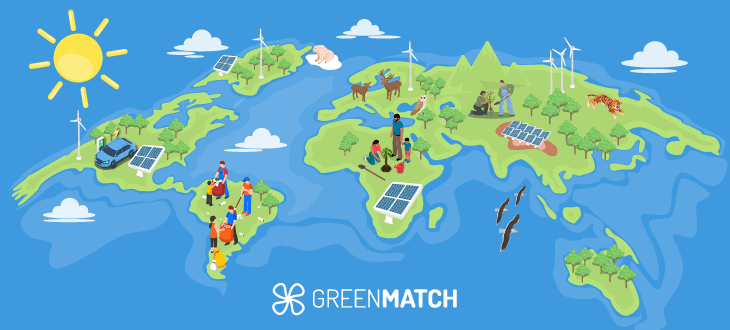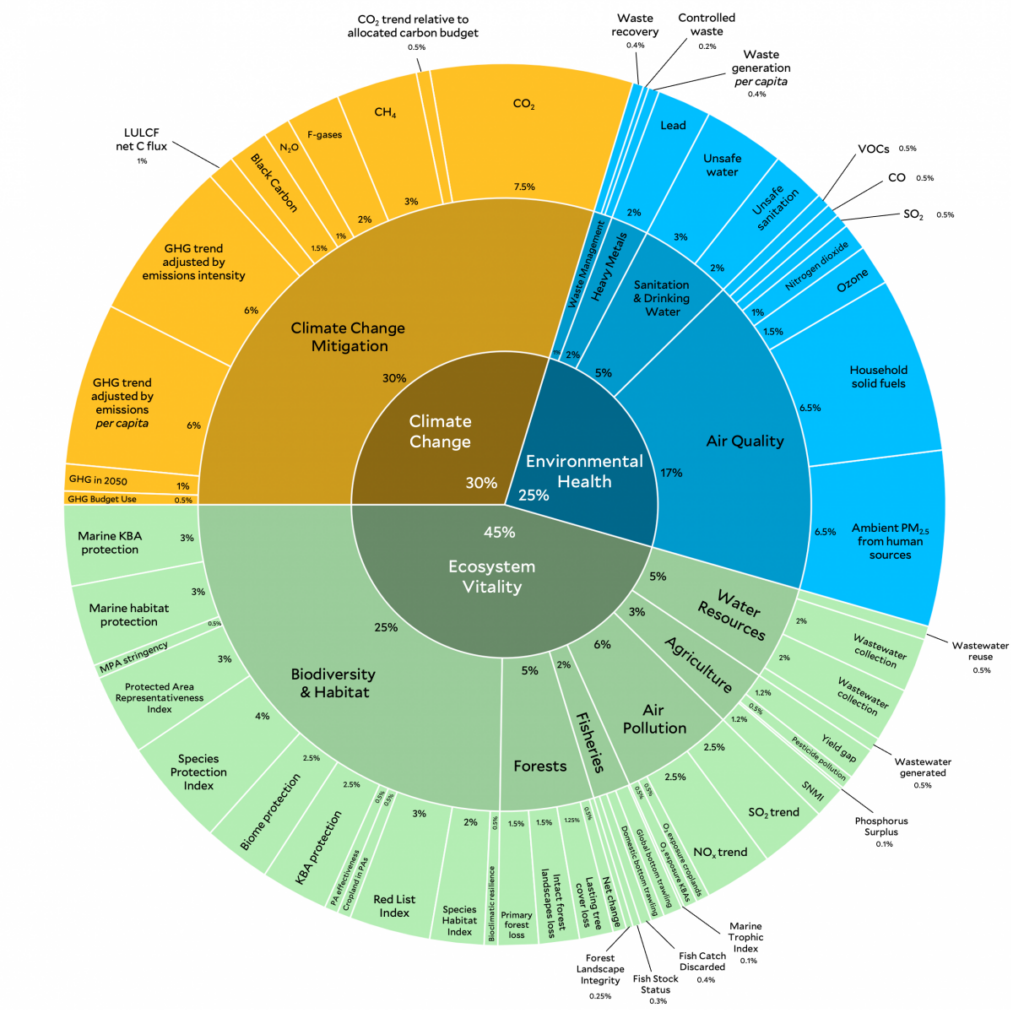- GreenMatch
- Blog
- World Environment Day: Restoring Our Planet with Renewable Energy
World Environment Day: Renewable Energy's Role in Land Restoration 2026

- Renewable energy helps restore damaged land and fight climate change using solar panels and wind turbines.
- Clean energy projects can improve soil health, save water, and make farming better in dry areas that are at risk of turning into deserts.
- Governments need to support renewable energy with good policies and work together with companies to create a greener future for everyone.
As we approach World Environment Day 2026, focusing on renewable energy as a catalyst for land restoration and environmental sustainability has never been more critical. Renewable energy can catalyse land restoration and promote environmental sustainability.
It is a cornerstone in the fight against land degradation and desertification, offering sustainable solutions to restore ecosystems and enhance resilience against climate change.

Harnessing solar, wind, and biomass energy power, previously barren lands can be transformed into productive landscapes. For instance, solar farms can be established on barren lands, providing clean energy while promoting vegetation growth under the solar panels.
With global capacity reaching 2,800 GW in 2023, the potential for positive impact is immense. Investments in renewable energy projects range from £500,000 to £5 million. This theme highlights the urgent need to address land degradation. It affects up to 40% of the planet's land and threatens half the global GDP.
This dual-use approach not only generates electricity but also helps in restoring soil health and biodiversity.
Global Environmental Progress: Insights from the 2024 EPI
The 2024 Environmental Performance Index (EPI) shows how countries are doing with their environmental efforts. The evaluation is based on 180 countries' performance in climate change, environmental health, and ecosystem vitality using 58 indicators in 11 different categories.
Estonia leads the pack with the highest score. Many European countries are doing well, too. The United States ranks 34th, showing it has room to improve.
Countries with better EPI scores often use more renewable energy. This proves that clean energy helps the environment. The EPI rankings show which countries are leading in protecting our planet. They also highlight where others need to step up their game.
These findings support the main idea, proving renewables are essential for better environmental outcomes. They show how important it is for more global investment in renewable energy to fight climate change. The EPI helps us see which countries are on the right track and which ones need to do more.
Renewable Energy and Land Restoration
Integrating renewable energy projects with land restoration initiatives offers a promising approach to revitalising degraded areas and combating desertification.
Renewable energy sources can significantly benefit land restoration projects such as reforestation and soil regeneration. In regions where water scarcity poses a significant challenge, solar-powered water pumps provide a sustainable solution for irrigation. About 2 million of these pumps are installed worldwide, supporting the growth of trees and crops.
For instance, the EcoFuture project in the Jordan Valley aims to develop a climate-change adaptation program. This program includes renewable energy solutions such as solar desalination and smart agriculture in acclimatised greenhouses. This project addresses water scarcity and promotes sustainable agricultural practices, enhancing soil fertility and reducing land degradation.
Wind power and forest restoration can be synergistic. Wind turbines, often placed on large plots of land, can coexist with reforestation projects. This dual use of land helps generate clean energy while restoring degraded ecosystems. For example, reforestation can improve soil conservation, water retention, and biodiversity, creating new habitats for wildlife and providing sustainable livelihoods for local communities.
Renewable energy helps fix damaged land and fight climate change. Solar panels and wind turbines can turn barren areas into useful spaces. They make clean power and help plants grow. In 2023, the world had 2,800 GW of renewable energy. This shows how much we can do to help the planet.
Projects can cost between £500,000 and £5 million. They're worth it because they can save land that gives us food and homes.
Solar farms are a good example. They make electricity and let plants grow under the panels. This helps soil health and brings back wildlife. Wind farms can work with tree planting, too. They make energy and create new homes for animals.
The EPA's RE-Powering America's Land Initiative encourages renewable energy development on contaminated lands, landfills, and mine sites. Often unsuitable for other uses, these sites can be repurposed for solar energy projects, turning previously degraded land into productive areas. This approach generates clean energy and revitalises the land, reducing environmental impacts and supporting local economies.
These projects don't just help nature. They also create jobs and support local communities. Using renewable energy can make our land healthier and our future brighter.
Statistical Impact
To illustrate the impact of renewable energy on land restoration, desertification, and drought resilience, consider the following hypothetical data:
- Land Restored: Renewable energy projects have restored approximately 10,000 hectares of degraded land.
- Water Usage Reduction: Implementing solar and wind energy has led to a 30% reduction in water usage.
- Agricultural Yield Increase: Integrating renewable energy with sustainable agricultural practices has resulted in a 15% increase in agricultural yield.
- Soil Erosion Reduction: The presence of renewable energy installations has reduced soil erosion by 25%.
- Groundwater Level Increase: Renewable energy projects have contributed to a 10% increase in groundwater levels.
- Economic Benefit: Renewable energy projects generate approximately £50 million in economic benefits each year.
- Carbon Sequestration: Renewable energy projects have sequestered around 100,000 tons of CO2 annually.

Image Credit: EPI Framework
Combating Desertification with Renewable Energy
Desertification poses a severe threat to fertile lands, but renewable energy offers viable strategies for prevention and reversal. Approximately 25% of global land is currently degraded, which requires innovative solutions. Solar panel power, in particular, provides a viable solution for arid and semi-arid areas.
Under a high emissions scenario, more than 70% of copper, cobalt, and lithium production might experience considerable or increased drought risk by 2050. These minerals are critical to the clean energy transition. It's up from less than 10% today.
Integrating renewable energy with sustainable agricultural practices, such as agroforestry and precise irrigation, can improve soil quality and prevent land degradation.
Moreover, wind-powered desalination plants convert seawater into fresh water. Bioenergy projects that produce biochar to improve soil fertility are additional strategies that leverage renewable energy to combat desertification. Currently, 743 GW of wind energy capacity is installed worldwide.
These practices improve soil health and water retention and increase crop yields, providing economic benefits to local farmers.
Enhancing Drought Resilience through Renewable Energy
With the UK's renewable energy share reaching 47% of electricity generation in 2023, the commitment to renewable solutions is evident. Solar-powered desalination plants, which account for 60% of new plants, provide essential fresh water, reducing the impact of drought and supporting sustainable water management practices.
Renewable energy technologies such as solar-powered water pumps and desalination plants significantly enhance drought resilience.
For example, in California, deploying solar and wind energy has helped compensate for electricity deficits caused by reduced hydropower generation during droughts. This shift ensures a stable energy supply and conserves water resources for agricultural use.
The same goes for the UK, where solar-powered desalination plants provide a sustainable solution to water scarcity in coastal regions. Additionally, solar-powered water pumps can be used in rural areas to extract groundwater efficiently, supporting agricultural activities and reducing the impact of drought on food production.
Moreover, Desalination plants powered by renewable energy provide an alternative source of fresh water, essential for drought-prone regions. These plants can significantly reduce the pressure on freshwater resources by converting seawater into potable water. With over 16,000 global desalination plants, solar and wind energy can power these processes, making them more sustainable and cost-effective in the long run.
| Indicator | Current Data (2024) |
|---|---|
| Global Land Degradation (%) | 25% |
| Annual CO2 Emissions (Gt) | 36 |
| Renewable Energy Share of Global Energy (%) | 28% |
| Area Affected by Desertification (Million km²) | 12 |
| Solar-powered Water Pumps Installed Worldwide (Units) | 2 million |
| Wind Energy Capacity Installed Worldwide (GW) | 743 |
| Global Freshwater Demand Increase by 2050 (%) | 55% |
| Cost of Solar Energy per kWh (GBP) | 0.05 |
| Cost of Wind Energy per kWh (GBP) | 0.04 |
| Number of Desalination Plants Worldwide | 16,000 |
In Africa, officials have signed a £9.45 million agreement to scale solar irrigation across drought-affected regions. This demonstrates the potential of renewable energy to support agriculture and enhance drought resilience.
Policy and Advocacy for a Greener Future
The importance of policies and regulations promoting renewable energy cannot be overstated. Effective policy frameworks are essential for driving the transition towards a greener future. Governments must implement policies that incentivise adopting renewable energy technologies through subsidies, tax breaks, and grants.
Furthermore, regulators should implement measures to ensure developers design new developments sustainably, prioritizing renewable energy integration.
The European Green Deal, for example, aims to make Europe the first climate-neutral continent by 2050. This ambitious policy framework includes investing in environmentally friendly technologies, decarbonising the energy sector, and promoting energy efficiency. Such policies drive the adoption of renewable energy and ensure the sustainable use of natural resources and biodiversity protection.
Furthermore, collaborative efforts between governments, non-governmental organisations, and the private sector are essential. These efforts aim to create an enabling world environment for renewable energy projects. By fostering a culture of sustainability, we can accelerate the transition to clean energy and mitigate the impacts of climate change.
Embracing Renewable Energy Solutions
Embracing renewable energy solutions is imperative for achieving a sustainable and greener future.
Communities and individuals can support renewable energy and world environmental sustainability by adopting energy-efficient practices and investing in renewable energy technologies. Allocating the renewable energy investment funds of £4 trillion per year towards policy and advocacy initiatives can be highly effective. This approach incentivises clean energy adoption and the transition to a greener tomorrow. Additionally, it supports sustainable development projects.
Individuals can engage with policymakers, participate in advocacy campaigns, and support organisations working towards a greener future. By investing in renewable energy, communities can reduce their carbon footprint, enhance energy security, and contribute to global efforts to combat climate change.
Summary
World Environment Day 2024 emphasises the urgent need to embrace renewable energy solutions for a greener future. With global land degradation affecting 25% of the land, annual CO2 emissions at 36 gigatonnes, and renewable energy accounting for 28% of global power, we face significant environmental challenges.
Through collective efforts in renewable energy adoption, land restoration, and sustainable practices, we can combat desertification, enhance drought resilience, and promote environmental sustainability. These actions are crucial for ensuring a healthier planet for future generations.
Renewable energy, with its capacity to restore degraded lands, combat desertification, and enhance drought resilience, is at the forefront of our journey toward a sustainable future. We can create a healthier planet and secure a sustainable future for future generations.
This World Environment Day, let us commit to supporting renewable energy initiatives and advocating for environmental sustainability policies.

Inemesit is a seasoned content writer with 9 years of experience in B2B and B2C. Her expertise in sustainability and green technologies guides readers towards eco-friendly choices, significantly contributing to the field of renewable energy and environmental sustainability.
We strive to connect our customers with the right product and supplier. Would you like to be part of GreenMatch?

